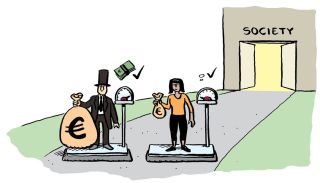Budget 2024 - Select Committee on Budgetary Oversight

In discussing the impact of Budget 2024 with the Select Committee on Budgetary OversightSocial Justice Ireland made the following observations: Overall, Budget 2024’s legacy will be to widen further the gap between the better off and those on the lowest welfare and work incomes; given the resources available it is a regrettable outcome. There is considerable evidence to show that the cost-of-living crisis hits low-income families the hardest.
Budget 2024 was an opportunity for Government to address this. Instead, it contained a range of temporary measures for the poorest, while favouring wealthier households with permanent tax changes. In the immediate term, counting both permanent and temporary measures, the Budget gives more resources to lower income households. Given the challenges that so many households face in making ends meet, particularly those on the lowest incomes, much of that assistance is welcome and badly needed. However, once these temporary measures are discontinued (from April 2024 onwards), the gains to welfare dependent households in this Budget will fall by 35 to 46 per cent.
Social Justice Ireland made the case foradjustments in core social welfare rates in the Social Welfare Bill 2023:
The €12 increase in core social welfare rates fails to make up for the impact that inflation continues to have on poorer households. A €25 boost was the minimum required for Government to benchmark rates to 27.5% of average weekly earnings. This was the target set by Government in 2007. The €12 increase falls far short of achieving the modest 2007 target, leaving those on social welfare with less than a quarter of average weekly earnings.
Social Justice Ireland does not accept aspects of the Budget that ignore the most vulnerable and marginalised and leave Ireland’s poorest worse off when Budget 2024’s one-off measures are discontinued early next year. We call on Government to revisit its decisions in these areas and to make the necessary adjustments in the forthcoming Social Welfare Bill to ensure the most vulnerable are prioritised. In particular, we urge Government to increase core social welfare rates by €25 a week. Anything less is a failure of this Government to do what is necessary to address poverty.
The impact of Budget 2024 in the following areas were also discussed with the Committee:
Child Poverty
- 1 in 7 children (190,000) in Ireland are living in poverty. Budget 2024 did not contain the measures that would tackle child poverty, that would put more income into poorer families’ pockets and make the public services they rely on more available and more affordable.
- Child poverty solutions hinge on issues such as adequate adult welfare rates, decent rates of pay and conditions for working parents and aspiring parents, and adequate and available public services. Child benefit also remains a key route to tackling child poverty. It is of particular value to families on the lowest incomes. Government failed to implement these solutions in the budget.
- The failure to adequately increase core social welfare rates and Child Benefit and to address low pay leaves vulnerable families trailing behind. Government did not prioritise their access to housing, childcare, healthcare, education and other essential public services. While some welcome changes were announced regarding the Free School Book Scheme, National Childcare Scheme funding, the Hot School Meals Programme and maintenance grant thresholds, these remain insufficient.
Housing
- Continued inflation is primarily being driven by housing costs. It is clear that the housing crisis is fuelling the cost-of-living crisis, yet Government has again failed to support those most in need, in favour of subsidising property owners.
- Rather than increase housing stock, the extension of the Help to Buy and First Home schemes will simply maintain high house prices. Likewise, the Rent Tax Credit does not benefit low-income renters. Meanwhile, the commitment to build 9,300 social homes in 2024, fails to take account of the 1,567 shortfall on the 2022 target, and the likely shortfall from 2023.
- The Mortgage Interest Relief announced in Budget 2024 will benefit mortgage holders with tracker or variable-rate mortgages the most, irrespective of their capacity to pay. It is deeply regrettable that Government did not instead target borrowers of the more than 17,000 mortgages which fell into arrears as a result of rising costs.
Taxation policy
- The decisions made on taxation will widen divides in Irish society and are unfairly targeted. Raising the threshold for the higher rate of tax serves only to benefit those already on incomes above €40,000.
- While less regressive, changes to the USC will only benefit those with incomes above €22,920 and is negligible for workers earning between €15 and €20 per hour.
- Social Justice Ireland has continually highlighted the relevance of refundable tax credits as a means of making the taxation system fairer, especially for those in part-time low paid work.
Social Justice Ireland’s opening statement to the Select Committee on Budgetary Oversight is available here.